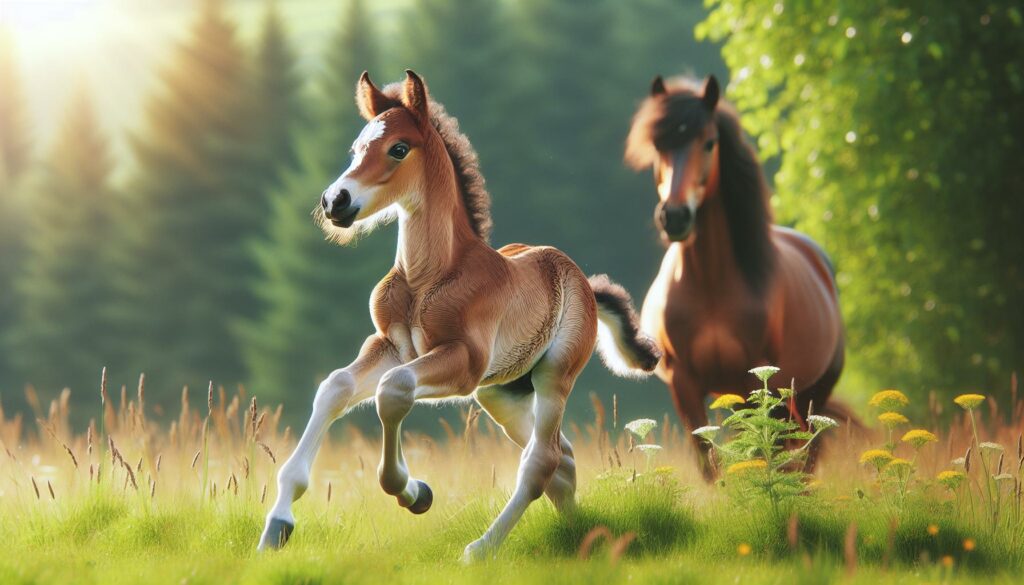Growing up, I was always captivated by the beauty and grace of baby:vmt4lncnhba= horse. There’s something magical about these majestic creatures, especially when they’re just babies. Watching a foal take its first wobbly steps or playfully gallop around is an experience that never fails to warm my heart.
In this article, I’ll explore the fascinating world of baby:vmt4lncnhba= horses, also known as foals. From their early development to the unique bond they share with their mothers, foals are a testament to the wonders of nature. Join me as I dive into the life of these adorable animals and uncover what makes them so special.
- Foals’ Growth and Development: Foals are born after approximately 11 months of gestation, weighing 50 to 100 pounds, and can stand and walk within hours of birth, showcasing their strong survival instincts.
- Playful and Curious Nature: Foals exhibit playful behaviors such as running and bucking, which are crucial for their physical development and social skills. Their curiosity helps them explore their environment and learn essential survival skills.
- Maternal Bonding: The relationship between a foal and its mother, or mare, is vital for emotional security, as the mare offers nourishment and protection that significantly impacts the foal’s growth.
- Health Care Essentials: Foals require proactive health management, including regular veterinary check-ups and attention to common health issues like colic and pneumonia, to ensure their overall well-being.
- Training Techniques: Positive reinforcement and consistency in training are essential for foals to develop good behavior and adaptability, preparing them for future experiences.
- Daily Care Importance: Establishing a routine for daily care, including proper nutrition, grooming, and a clean environment, fosters healthy growth and a strong bond between the foal and its caregivers.
Baby:Vmt4lncnhba= Horse
Baby:vmt4lncnhba= horse, known as foals, exhibit distinctive characteristics that set them apart from other animals. Foals are typically born after a gestation period of approximately 11 months. At birth, they weigh between 50 to 100 pounds, depending on the breed.
Foals experience rapid growth during their first few months. Within hours of birth, they can stand and walk, showcasing their strong instinct for survival. This ability allows them to nurse from their mothers, vital for their development.
Foal behavior reflects their playful and curious nature. They engage in running, bucking, and playful interactions with other foals. These activities help develop their physical skills and social bonds.
The bond between a foal and its mother, called a mare, forms early. The mare provides nourishment and protection, crucial for the foal’s well-being. This relationship fosters a sense of security, essential for a foal’s mental and emotional growth.
The captivating nature of foals lies in their rapid development, playful behavior, and strong maternal bonds. Their early experiences shape their future interactions and capabilities, contributing significantly to their remarkable journey into adulthood.
Characteristics of Baby:Vmt4lncnhba= Horse
Foals exhibit unique characteristics that enhance their charm and functionality as future adult horses. These features encompass both physical and behavioral traits that are essential for their growth and development.
Physical Traits
Foals possess various physical traits that distinguish them from older horses. Typical characteristics include:
- Size: Foals generally weigh between 50 to 100 pounds at birth, with an average height of around 24 inches.
- Leg Proportions: They exhibit long legs that make up about 80% of their adult height, enabling them to stand and walk shortly after birth.
- Coat: Foals are born with a soft, fluffy coat that serves to provide warmth and protection. This coat often changes as they mature.
- Eyes: Their large, expressive eyes allow for enhanced visual perception, aiding in their awareness of surroundings and potential dangers.
These traits contribute to the foal’s adaptability and survival in the wild.
Behavioral Traits
Foals display a range of behavioral traits that are vital for their social and physical development. Key behaviors include:
- Playfulness: Foals engage in frequent play, which includes running, bucking, and frolicking. This behavior helps develop their physical coordination and strength.
- Curiosity: A foal’s inquisitive nature drives them to explore their environment. This curiosity fosters cognitive development and learning.
- Social Interaction: Foals often interact with their mothers and other foals, learning essential social skills. These interactions pave the way for future bonding and herd dynamics.
- Imitation: Foals mimic the behavior of their mothers and other horses, which is critical for learning essential survival skills, such as grazing and running.
These behavioral traits play a significant role in shaping a foal’s future interactions and their ability to thrive in various environments.
Health Considerations for Baby:Vmt4lncnhba= Horse
Foals require careful attention to their health to ensure a strong start in life. Understanding common health issues and implementing preventative care plays a crucial role in their development.
Common Health Issues
Foals face specific health challenges during their early months. These issues can include:
- Colic: A common condition caused by gastrointestinal discomfort. Signs include restlessness and rolling.
- Pneumonia: Often arising from environmental factors, presenting symptoms like coughing and nasal discharge.
- Diarrhea: This can indicate infections or dietary problems. Monitoring consistency is essential.
- Joint Problems: Conditions like angular limb deformities may occur, particularly in overfed foals.
- Umbilical Infection: Infection can develop in the umbilical cord, causing swelling and discharge.
Early detection of these issues leads to timely intervention and treatment.
Preventative Care
Maintaining a foal’s health involves proactive measures. Key practices include:
- Regular Veterinary Check-Ups: Schedule visits for vaccinations and health assessments. These visits help identify potential problems.
- Proper Nutrition: Provide a balanced diet that includes ample mare’s milk followed by quality hay and grain as they grow.
- Hygiene: Keep living environments clean to reduce exposure to pathogens.
- Socialization: Encourage interaction with other horses to promote mental and emotional health.
- Exercise: Allow space for natural movement to strengthen muscles and bones.
Implementing these preventative care practices helps ensure foals develop into healthy, robust adult horses.
Training and Care Tips
Training and caring for foals requires patience and consistency. Establishing a solid routine ensures that foals grow into well-adjusted adult horses.
Training Methods
Positive reinforcement proves effective when training foals. Techniques like clicker training introduce cues and rewards for desired behaviors. Short, frequent sessions maintain the foal’s attention and promote learning. Gradually introduce basic commands, such as “whoa” and “walk on.” Socialization with other horses and humans enhances their confidence and prevents behavioral issues. Exposing foals to various environments encourages adaptability, helping them adjust to different situations as they mature.
Daily Care Routines
Daily care routines play a critical role in a foal’s development. Begin each day with checks on their health and behavior. Observe for signs of discomfort, such as lethargy or refusal to eat. Provide fresh water and high-quality hay or pasture grass, ensuring proper nutrition. Grooming fosters a bond and maintains coat health, while hoof care, including regular trimming, prevents future problems. Engage in interactive play to stimulate their curiosity and build physical coordination. Lastly, maintain a clean living environment to promote hygiene and well-being.
The journey of a foal is nothing short of magical. From their first moments to their playful antics I can’t help but feel a deep appreciation for their unique qualities. Observing their growth and development truly highlights the bond they share with their mothers.
Caring for these young baby:vmt4lncnhba= horse requires dedication and knowledge. By focusing on their health and well-being I can ensure they grow into strong and confident adults. The right training and nurturing environment will set the stage for their future successes.
Every moment spent with foals is a reminder of the beauty of nature and the incredible potential these creatures hold. I’m excited to continue this journey and witness the remarkable transformations that await them.

